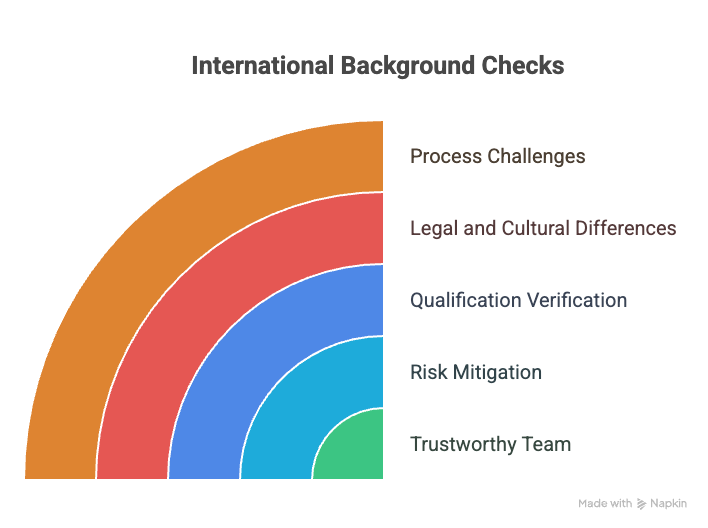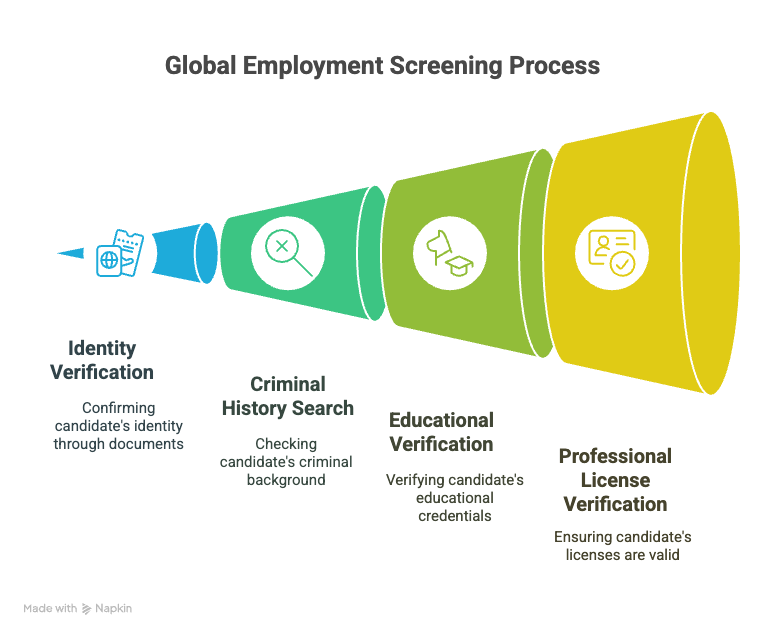In an increasingly interconnected world, businesses are expanding beyond borders, searching for talent across the globe to bolster their teams. With this global reach comes the added complexity of conducting thorough international background checks for staffing purposes. This guide aims to demystify international background screening processes, covering everything from compliance with multinational hiring practices to practical steps for cross-border checks. Whether you're a recruiter navigating international waters or a candidate preparing for a job that spans continents, understanding these processes can smooth your way forward.
Key Takeaways
- Companies are expanding their hiring practices globally, breaking geographical barriers to find top talent.
- International background checks help verify qualifications and identify potential criminal histories in global candidates.
- Verifying identities, criminal records, and educational and professional credentials across borders is challenging yet essential.
- Compliance is crucial, as different countries have unique legal requirements like GDPR for data protection.
- Using local expertise and technology can streamline cross-border background checks and enhance hiring strategies.
Introduction
Companies are hiring globally more than ever before. They're not just looking for local talent but searching far and wide, breaking the barriers of geography. This trend of global hiring presents unique challenges, especially when it comes to ensuring that the candidates are who they claim to be. You must navigate different countries' laws and languages to verify candidates' backgrounds accurately.
International background checks play a pivotal role in this process. They are critical because they help ensure that the new hire is checked for qualifications, past employment, and any criminal history. The stakes are high when your workforce spans multiple countries. You need to maintain the quality and reliability of your talent, regardless of where they come from.
This article will guide you through international background screening, shedding light on compliance, processes, and best practices. Whether you're dealing with multinational hiring from the recruiter’s seat or preparing as a candidate for jobs that cross continents, understanding these checks will pay off.
EXPERT INSIGHT: As an HR professional who has successfully navigated the complex complexities of cross-border recruitment, I have come to have a deep appreciation of the importance of international background checks—not just for compliance purposes, but for the trust that they build. Behind every credential is a person, a story, and the obligation to make good, ethical hiring decisions. It is no easy task; the intersection of language, law, and culture can turn the process into a high-wire act. But when done with sensitivity, it not only protects your organization but also respects the candidate's journey. At the center of worldwide hiring is a very human principle: a commitment to fairness, transparency, and equal opportunity. - Charm Paz, CHRP
Understanding International Background Checks
International background checks are evaluations of an individual's history conducted across multiple countries. Unlike domestic checks, which focus on records within one's home country, these screenings encompass a broader scope. They consider criminal records, education, employment history, and other critical data across various jurisdictions.

Why are these checks important for global placements? They help verify qualifications and past employment, which is crucial when hiring from different educational and professional standards. These checks also mitigate risks by identifying potential criminal histories, ensuring that you're building a trustworthy team.
However, conducting these checks isn't straightforward. You're dealing with multiple systems, each with its language, privacy laws, and access restrictions. For example, obtaining a criminal record in one country may be as simple as a database search, while another nation might require an official government request. These discrepancies make the process challenging. You need to account for language barriers, as translating documents accurately is crucial for maintaining the integrity of the information.
Are you familiar with the legal and cultural differences in the countries you're engaging with? Understanding these differences can streamline your screening process and avoid potential pitfalls. It also ensures that the process respects local regulations, fostering trust with international candidates.
Components of Global Employment Screening
Effective global employment screening involves verifying identities, criminal histories, educational credentials, and professional licenses across borders. Each component has unique challenges.

Identity Verification: Confirming identities internationally starts with careful examination of passports, national IDs, and other official documents. Discrepancies in naming conventions or transliterations can complicate this process. In countries where digital records are sparse, you might rely on local experts for verification.
Criminal History Searches: Conducting criminal background checks outside the U.S. is not straightforward. Access to data varies, and legal restrictions often limit what can be searched. European nations, for example, have stringent privacy laws that can restrict access to criminal records. In some countries, you may need consent from the candidate just to initiate a search.
Educational and Employment Verification: Verifying international degrees and job histories requires time and patience. Educational institutions and former employers may operate on different timelines. Accrediting bodies and school closures can add layers of complexity. Credentials from countries lacking centralized digital records might need in-person visits or local contacts.
Professional License Verification: This ensures that candidates’ professional licenses are valid and recognized. Different countries may have varying standards and requirements for similar professions. Failure to confirm these can result in hiring unqualified candidates, affecting your business credibility.
A practical approach to these checks is vital. Rely on international networks and local experts to fill gaps in knowledge. Keep track of legal standards and cultural nuances. This framework enhances the accuracy and reliability of your international screening processes.
Compliance with Multinational Hiring Practices
Understanding the compliance landscape is crucial for international background checks. Each country has its own set of rules that can affect how you conduct these checks. In the European Union, the General Data Protection Regulation (GDPR) stands out as a major framework governing data protection. It requires employers to handle personal data lawfully, fairly, and transparently.
Beyond GDPR, local labor laws often dictate specific disclosures and consent requirements. For example, in some jurisdictions, you may need the candidate's explicit agreement before initiating a background check. Always familiarize yourself with the specific legal requirements of each country you're hiring in.
Data privacy cannot be overlooked. Ensuring the confidentiality of a candidate's information is not just a legal obligation but also an ethical one. Storing data securely and limiting access only to those who need it are basic steps in maintaining privacy.
Cultural sensitivity is equally important. What might be a standard practice in one country could be intrusive in another. Being aware of these differences helps maintain respect and fairness throughout the hiring process.
You can also rely on global standards and guidance from organizations like The Professional Background Screening Association (PBSA). These resources offer best practices for conducting checks ethically and legally across borders. Balancing these elements ensures a smooth international hiring process that respects both legal standards and cultural differences.
Cross-Border Background Checks: A Step-by-Step Guide
Handling international background checks requires meticulous planning and a well-thought-out approach. Here's a straightforward path to follow:
Initial Planning and Coordination: Start by clearly defining the scope of the checks. Identify which regions and countries are involved and the specific requirements they entail. Make sure your team knows the goals, timelines, and legal considerations. Coordination is key, so ensure that roles and responsibilities are well distributed among team members.
Local Expertise and Partnerships: Engaging with local experts can be invaluable. They understand regional nuances, such as cultural expectations and local regulations. Partnering with in-country professionals or agencies can smooth the process and reduce the likelihood of legal or procedural missteps.
Technology and Tools: Leverage technology to manage the screening process efficiently. Consider using software designed for international HR tasks, which can track progress and ensure compliance. Tools that support multi-language capabilities and cross-time-zone coordination are particularly beneficial.
Dealing with Delays and Obstacles: Delays may occur due to different legal processes or data availability in countries. Prepare for this by building buffer time into your project schedules. Communicate clearly with both candidates and stakeholders about potential delays and set realistic expectations. Having a plan for common hiccups, like handling incomplete information or delayed responses, can keep the process moving smoothly.
Taking these steps can help you navigate the complexities of cross-border checks, making them a reliable part of your hiring strategy. How do you manage your international screening processes today? Could these steps help refine your approach?
Best Practices for Multinational Companies
Consistency is your foundation when handling background checks across borders. A uniform screening policy ensures fairness and transparency in your hiring process. It promotes equality while respecting local laws and customs. Variations in legal and cultural standards can be navigated by understanding local regulations and adapting your approach accordingly.
Training is crucial. Equip your HR team with the knowledge of international screening protocols. Regular workshops and refreshers can ensure that your team remains informed about the complex landscape of international compliance. This education can lead to more effective screenings and help avoid costly mistakes.
Regular evaluation of your screening processes is fundamental. Laws change, and industry standards evolve. Schedule periodic reviews to ensure your practices remain compliant with international laws. This not only mitigates risk but also maintains your company’s reputation as a responsible employer.
Tap into available resources to aid your screening processes. Internal portals, external forums, and professional blogs like GCheck’s Blog can provide valuable insights and updates. Leveraging these tools can help your team keep pace with international hiring trends and regulatory changes.
By integrating these practices, your company can navigate the complexities of multinational hiring with confidence and integrity.
Candidate Perspective: Preparing for an International Background Check
Understanding the international background check process is crucial as a candidate. Preparing yourself can prevent unnecessary delays and ensure smooth handling. It's more than just a formality; it's a critical step in the hiring process.
Start by knowing what to expect. International checks often include verifying your identity, education, employment history, and, sometimes, professional licenses. Each country may have its own rules and timeline, so familiarize yourself with the variations that may apply to your specific situation.
Organize your documents. Ensure your passport, academic records, past employment details, and any professional certifications are up-to-date and easily accessible. Be prepared to provide translations if necessary; some employers may require documents in their local language.
Stay proactive in addressing discrepancies. Should mismatches in your information arise, tackle them head-on. Whether it's a name change or a gap in employment, clarify these with your potential employer as soon as possible. Clear communication can prevent misunderstandings and potential red flags during the screening.
Prepare thoughtfully, keep your documents ready, and communicate openly. Knowing what’s coming can make a world of difference and help you put your best foot forward in an international job search.
Conclusion
International background screening is an essential component of the global hiring process. We've covered the intricacies and challenges of conducting these checks, from verifying identities to ensuring compliance with diverse legal standards. Whether it's navigating GDPR or understanding cultural nuances, the journey demands vigilance and thoroughness.
The future promises an increase in technology-driven solutions that streamline cross-border checks, potentially reducing delays and improving accuracy. Trends suggest a growing emphasis on data privacy and ethical practices, ensuring the security and dignity of candidates worldwide.
As you engage in international hiring, remember it's a two-way street. Employers and candidates alike should commit to transparency and collaboration. By embracing these principles, you contribute to building diverse, inclusive, and dynamic workplaces that transcend borders.
Frequently Asked Questions (FAQs)
What is international background screening and why is it important?
International background screening involves checking the credentials, history, and qualifications of individuals across different countries. It is important because it ensures you hire trustworthy employees who meet your expectations and industry standards, no matter where they come from.
How do global background checks differ from domestic background checks?
Global background checks are more complex than domestic checks. They involve navigating multiple countries' laws, languages, and databases. This requires additional time and resources compared to domestic checks, which are typically more streamlined due to fewer legal and logistical barriers.
Are international criminal background checks legal in every country?
Not every country allows international criminal background checks. Some have strict privacy laws that limit access to criminal records. It's crucial to research the legal requirements of each country where you plan to conduct these checks.
What challenges do employers face when screening international candidates?
Employers face challenges like language barriers, differing legal frameworks, and difficulties in verifying foreign documents. Access to reliable and accurate data can also be problematic depending on the country's data protection regulations.
How can companies stay compliant with international background check laws?
Companies can stay compliant by researching and understanding the specific legal requirements in each country. Consulting with legal professionals or using background check services familiar with global regulations can help ensure compliance.
What information is typically sought in international background checks?
International background checks often seek information such as criminal records, employment history, education verification, and identity checks. Depending on the role, additional checks like credit history or professional licenses might be necessary.
How long does an international background check take?
The duration of an international background check varies. It can take anywhere from a few days to several weeks, depending on the country and type of information requested. Factors such as local holidays and the responsiveness of foreign institutions can also affect the timeline.
What are the best practices for conducting international background checks?
It's best to conduct thorough research on local laws, respect the candidate's rights, and obtain their consent. Using a reputable screening service with global expertise can ensure accuracy and compliance efficiently.
Why is candidate consent crucial in international background screening?
Candidate consent is crucial because it is a legal requirement in many countries. It ensures that the process respects the individual's privacy and adheres to data protection regulations. Without consent, companies risk legal penalties and damage to their reputation.
Definitions
Background Checks
A background check is a process used by employers to verify a candidate's identity, employment history, education, criminal record, and other relevant credentials. It helps confirm that the information provided by the applicant is accurate and that the individual poses no risk to the organization. For international roles, these checks span multiple countries and require compliance with local regulations.
Identity Verification
This confirms that a person is who they claim to be. It often involves reviewing passports, national ID cards, or other legal documents. In global hiring, discrepancies in spelling or different naming conventions can cause issues, especially when translated across languages. Confirming identity lays the foundation for the rest of the screening process.
Employment Verification
This confirms a candidate’s job history by contacting previous employers or checking official documentation. Employers want to know the candidate’s job titles, dates of employment, and performance history. For international candidates, this may require working with foreign companies and accounting for varying formats and languages.
Data Privacy
Data privacy refers to how personal data is collected, stored, and shared during the hiring process. Employers must follow laws like GDPR in Europe, which demand clear candidate consent and secure data handling. Mishandling sensitive data can lead to legal trouble and damage a company's reputation.
Compliance
Compliance means following all legal rules and standards tied to hiring. This includes national labor laws, data protection regulations, and industry-specific rules. Compliance helps ensure fair hiring and protects both employers and candidates. It also prevents delays, penalties, or legal issues due to foreign law violations.
References
- Global Employment Screening Services Market Report 2025
- Employment Criminal Background Check Services Market 2025

GCheck Editorial Team
Meet the GCheck Editorial Team, your trusted source for insightful and up-to-date information in the world of employment background checks. Committed to delivering the latest trends, best practices, and industry insights, our team is dedicated to keeping you informed.
With a passion for ensuring accuracy, compliance, and efficiency in background screening, we are your go-to experts in the field. Stay tuned for our comprehensive articles, guides, and analysis, designed to empower businesses and individuals with the knowledge they need to make informed decisions.
At GCheck, we're here to guide you through the complexities of background checks, every step of the way.






